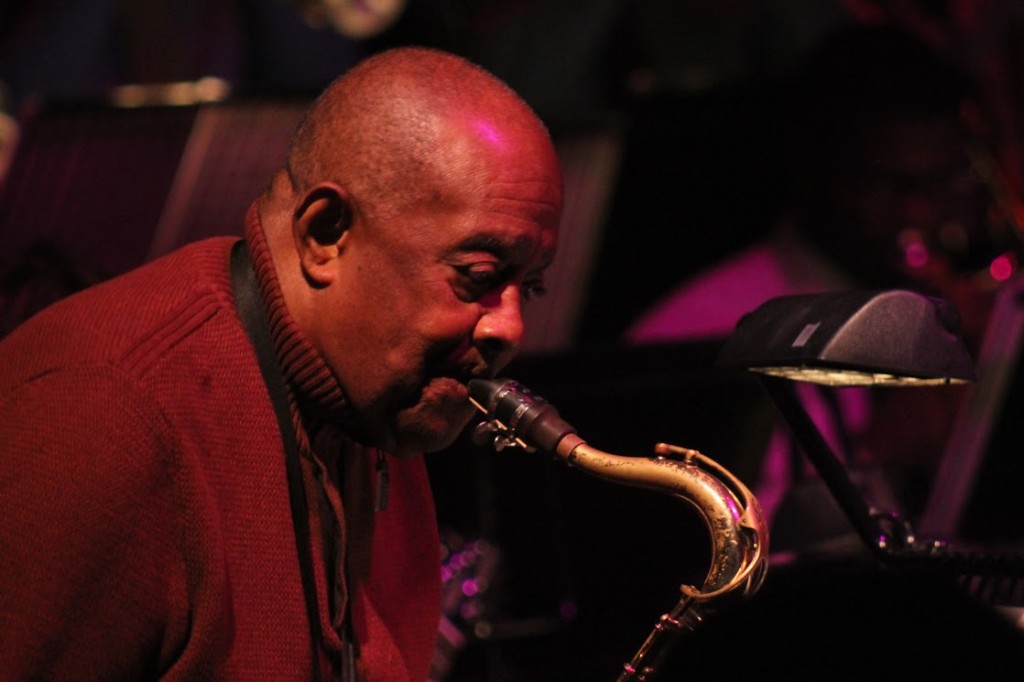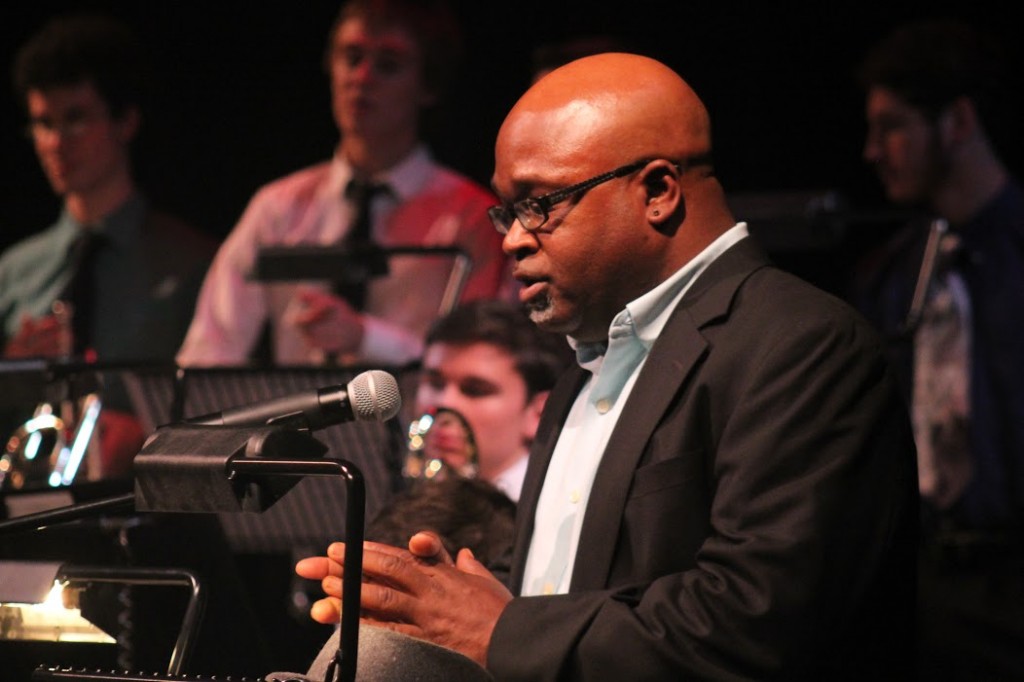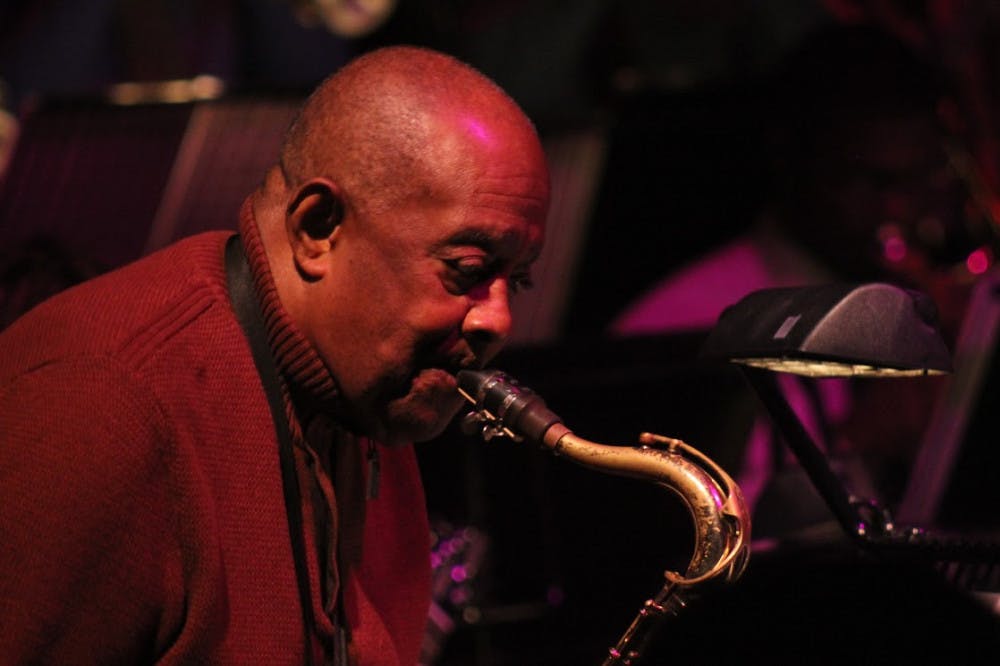By Sydney Shaw
Opinions Editor
The smooth sound of a saxophone flooded the Don C. Evans Black Box Theatre as local legend Thomas Grice serenaded students with soulful jazz and spoke about the music scene in Trenton on Wednesday, Oct. 29. As the second and final installment of the Trenton Makes Music series, the event highlighted the rich history of music in New Jersey’s capital city.

Grice, renowned musician and brother of famed jazz artist Gigi Gryce, accompanied the College’s jazz ensemble to benefit the Don Evans Memorial Endowment Fund, a charity that supports students pursuing arts education but struggle with financial hardship.
The concert was held in conjunction with a class tailored to incoming freshmen at the College, Trenton Makes Music, taught by journalism professor Kim Pearson. The class aims to produce a multimedia website documenting the stories of dozens of Trenton musicians.
“The cultural bounty of this region needs to be better known and understood,” Pearson said before the show.
The ensemble, led by Gary Fienberg, performed “Quiet Nights of Quiet Stars,” the evergreen of Antônio Carlos Jobim. In the ’50s and ’60s, Jobim was the driving force behind the creation of the Brazilian bossa nova style, a fusion of samba and jazz.
A rendition of “Emancipation Blues” by Oliver Nelson ebbed through different tones and temperaments, capped by an exploding finale. Audience members couldn’t help but snap their fingers along as Grice complemented the piece with groovy improvisations.
During a brief interlude, Todd C.C. Evans read a heartfelt poem titled “Father Said,” dedicated to his father — the man who gave the Black Box Theatre its name. The late Don Evans was a community activist, an off-broadway playwright and director of the College’s Minority Executive Council. He also established the History of Jazz course at the College.
“This event has the feel of my father,” Evans said. “He loved his students, he loved teaching and he loved jazz.”

In his poem about fighting off a bully by employing advice from his father, Evans said his father “poured courage in my heart and wisdom in my head.”
“He taught me a lot of lessons — not exactly like the ones he taught in class here — but they were life lessons,” Evans said.
The next song in the concert was Bobby Timmons’s “Moanin’,” which opened with staccato piano and melted into a cool melody.
Grice and the ensemble were bathed in amber light as they performed “Sister Sadie” composed by Horace Silver. The fast-paced swing song featured a solo performance from junior music education major Paul Winch on trombone.
“Sister” was followed by a significantly more modern sounding piece. Composer Chick Corea grew up during the Hard Bop era. His music fuses electronic elements with classic funky jazz sounds, so the ensemble’s performance of “Señor Mouse” had a much different sound than previous pieces. The alternating solos between saxophonists senior music education major Manuel Martinez and freshman electrical engineering major Randell Carrido brought the interpretation to life.
“Being a music teacher was the joy of my life,” Grice said after the show. “I think I was born to be a teacher.”
After receiving his MA from Columbia University, Grice went on to play with the likes of Betty Carter, Ben Riley and Donald Byrd.
He skimmed over the extensive list of famous Trenton-born musicians, whom he had mentored during his days working in the public school system: Ice Capades conductor Steve Kramer; Kevin Eubanks from The Tonight Show Band, the house band of Jay Leno’s late-night talk show; trumpeter Michael Ray, who collaborated extensively with Sun Ra; bebop-style saxophonist Richie Cole; and perhaps most prominently, “Lady Marmalade” singer Patti LaBelle.
Grice eventually moved on from working in local schools and started his own — the Thomas Grice Academy of Music in Trenton.
“Trenton’s contribution to popular music is very strong. It’s not advertised. It’s not as transparent as it should be,” Grice said. “Music is very spiritual, especially jazz.”
Regarding the state of music education in Trenton schools, Grice gave a sad smile and said his “hopes are high.” He believes there was a stark decline in the quality of music education provided to youth in Trenton over the past decade or so, but things are starting to look up.
“I would say music is coming back to Trenton,” Grice said. “We’re discovering that music, as the old saying goes, ‘soothes the beast.’ My mission is to get the guns out of the hands and replace them with instruments.”







